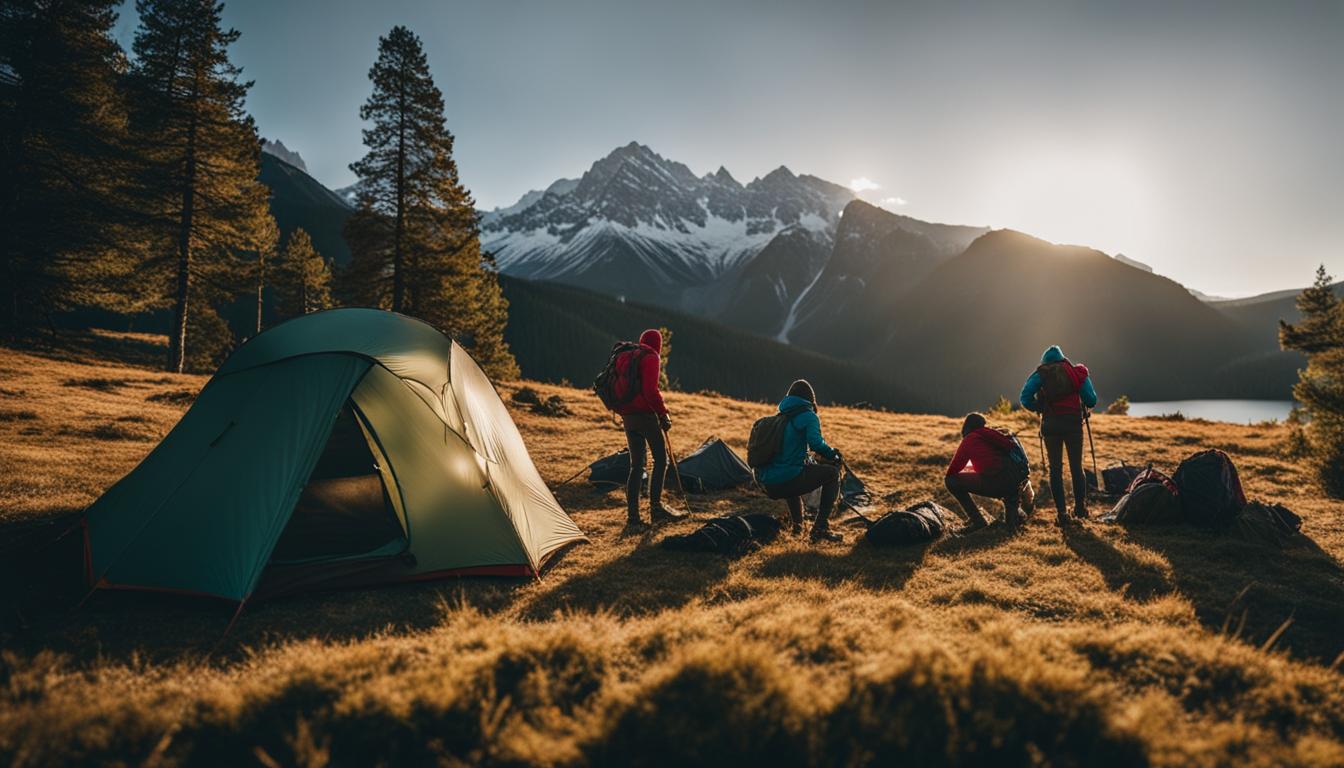When it comes to backpacking, it’s important to be mindful of our trail behavior. Responsible hiking and trail etiquette not only ensure a positive experience for ourselves but also help preserve the beauty of the outdoors for future generations. Let’s explore some dos and don’ts to keep in mind on the backpacking trail.
Key Takeaways:
- Practice minimum impact camping and camp in established sites to minimize environmental impact.
- Respect privacy by camping well away from other campers in pristine areas.
- Avoid contaminating water sources by camping at least 200 yards away from lakes and streams.
- Use established latrines or bury human waste in several inches of organic soil.
- Respect others’ space and use approved bear canisters to store food.
Trail Etiquette
When hiking on trails, it’s important to follow proper trail etiquette to ensure a positive and enjoyable experience for everyone. Here are some guidelines to keep in mind:
Stay on Established Trails
One of the fundamental rules of trail etiquette is to stay on established trails and avoid disturbing fragile areas. By sticking to designated paths, you help protect the environment and preserve the natural beauty of the landscape. Straying off-trail can cause erosion, damage vegetation, and disrupt wildlife habitats.
Yield to Other Trail Users
When encountering fellow hikers, it’s essential to practice courtesy and yield to those who have the right of way. Uphill hikers generally have the right of way, so step aside and allow them to pass without disrupting their momentum. Additionally, be considerate of other trail users, such as horseback riders and mountain bikers, and give them ample space to safely navigate the trail.
Maintain a Respectful Distance
Respecting personal space is a crucial aspect of trail etiquette. While it’s natural to enjoy the company of others on the trail, be mindful of not crowding or intruding on their solitude. Give fellow hikers enough space to fully immerse themselves in nature and enjoy their hiking experience without feeling encroached upon.
| Trail Etiquette Guidelines | Tips |
|---|---|
| Stay on established trails | Avoid damaging fragile areas and preserve the environment. |
| Yield to other trail users | Show courtesy to uphill hikers, horseback riders, and mountain bikers. |
| Maintain a respectful distance | Give fellow hikers space to enjoy their solitude on the trail. |
By adhering to these trail etiquette guidelines, you contribute to a harmonious hiking experience for yourself and others. Remember, hiking is not only about reaching your destination but also about appreciating the journey and the natural beauty that surrounds you.
What are the proper trail behavior dos and don’ts for backpacking?
When backpacking, essential backpacking skills like Leave No Trace principles, yielding the right of way, and avoiding cutting switchbacks are crucial. Do: Pack out all trash and waste, stay on designated trails, and be respectful of other hikers. Don’t: Litter, play loud music, or disturb wildlife.
Expedition Behavior
When embarking on outdoor adventures, practicing good expedition behavior is essential for a harmonious and enjoyable experience. It not only ensures your own comfort but also respects the needs and preferences of your fellow campers. Let’s explore some camping behavior guidelines that can make a significant difference:
Rise and Shine Responsibly
When sharing a tent with others, it’s crucial to be considerate of their sleeping patterns. Get out of bed in a timely manner, avoiding unnecessary noise or movement that could inconvenience or frustrate your tentmates. Additionally, be mindful of your morning cheerfulness, as not everyone may be a morning person.
Cultivate a Positive Atmosphere
While it’s natural to face discomforts or encounter unfavorable weather conditions during outdoor expeditions, refraining from constant complaining can help maintain a positive group dynamic. By focusing on the positives and approaching challenges with resilience, you contribute to a more enjoyable experience for everyone.
Contribute to Group Meals
A key aspect of camping manners is being able to contribute to the group’s meals. Learn to cook at least one dish well, allowing you to take an active role in the cooking duties. This not only eases the burden on others but also fosters a sense of camaraderie as you share delicious meals together.
Practice Safety and Self-Reliance
Outdoor etiquette includes taking responsibility for your own safety and being self-reliant to the best of your abilities. This means staying aware of your surroundings, following safety measures, and avoiding unnecessary risks or dangerous situations. By doing so, you protect yourself and others in the expedition.
By keeping these camping behavior guidelines in mind, we can all contribute to a more enjoyable and respectful outdoor experience. So, let’s be mindful of our expedition behavior and create lasting memories in the great outdoors!

